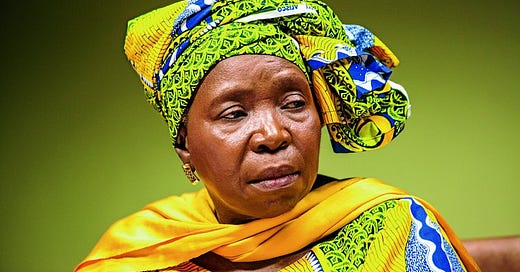South African court seeks records of decision-making behind Government Covid-19 lockdown policies
The public should use the records as an impetus and grounding to hold the South African government to account
by Russell Lamberti, Executive Director of Sakeliga and PANDA Exco member
For the first time since the declaration of South Africa's national state of disaster for Covid-19 in March 2020, the veil of secrecy over the government’s decision-making processes regarding Covid disaster management regulations will be lifted.
This is owing to a court victory after a two-year litigation battle that South African business organisation, Sakeliga ("business league"), achieved this month against Minister of Cooperative Governance and Traditional Affairs, Dr Nkosazana Dlamini-Zuma.
The Minister now has no other legal choice but to deliver a variety of records, reasons, reports, findings, deliberations, communications, memoranda and/or further documentation relied upon when she repeatedly exercised far-reaching powers under the Disaster Management Act to keep the country in the grip of erratic lockdown measures, including the numerous extensions to the State of Disaster. These lockdowns and other measures did unprecedented harm to the country's economic and social activity.
The public will now be able to see for themselves for what apparent reasons Dlamini-Zuma and her department imposed police-state conditions on the public to ensure people stayed in their homes, schools and universities remained closed, churches could not congregate, and businesses remained shut. As information about the damage caused by Covid restrictions globally emerges over time, Sakeliga has expressed the hope that members of the public will use records produced in their court victory as an impetus and grounding to hold the South African government to account for harmful decisions of the past and to prevent such egregious abuses of power re-occurring in the future.
It is of course possible that Dlamini-Zuma will claim that, in large part, the records to be provided in terms of the court order do not exist. Such a reaction would confirm suspicions that improper and arbitrary decision-making processes were followed in making Covid regulations. Even more so, in that case, it would mean that the government must and can now be called to account for gravely irresponsible actions.
Sakeliga’s legal battle was beset by government’s abuse of court rules and delaying tactics, such as filing irregular notices of complaint and later withdrawing them. Despite the government’s efforts to delay and derail the case keep it out of court, Sakeliga followed through with the process. Ultimately, the Minister did not bring herself to oppose the main application, and default judgement was taken on 9 November.
Sakeliga is still engaged in two other cases that seek to prevent future abuses of power in relation to communicable diseases:
A court application in the High Court in Pretoria to prevent the Disaster Management Act from being misused in the future to enforce draconian measures through regulation-making. Read more here.
A court case which already succeeded in June in eliminating mandatory mask wearing, mandatory vaccinations, and Covid travel requirements, and is still ongoing to prevent future attempts at invasive health monitoring. Read more here.
As regards the recently won case, Sakeliga will consider proceeding with an application to hold Dlamini-Zuma guilty of contempt of court if she fails to produce the relevant records by 9 December.
Find more at pandata.org | Keep the conversation open. Donate to support our work



Some good news. People need to be held to account for the damages they have caused - based on a pandemic that never 'happened'
Governments knew long ago about the harms and that their policies did not work. eg churches were closed based on zero scientific evidence, schools were closed despite evidence that his was ineffective, governments knew---because their own scientists told them that masks did not work and the arbitrary refusal to take account of PCR cycle thresholds and the use of scientifically unproven vaccine passports........the list is endless. If governments claim they did not know (in our case they definitely did, because I told them) ---why didn't they?